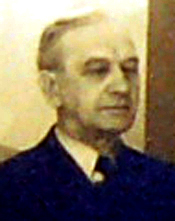Clarence W. Turner
Clarence Wyly Turner (born October 22, 1866 in Clydeton , Humphreys County , Tennessee , † March 23, 1939 in Washington, DC ) was an American politician . From 1922 to 1923 and again between 1933 and 1939 he represented the state of Tennessee in the US House of Representatives .
Career
Clarence Turner attended the common schools and then the National Normal Institute in Lebanon ( Ohio ). After a subsequent law degree at Northern Indiana Normal College in Valparaiso and his admission as a lawyer in 1904, he began to work in Waverly in his new profession. He also published a newspaper in this city.
Politically, Turner was a member of the Democratic Party . For 15 years he was its chairman in Humphrey County. He served in the Tennessee Senate from 1900 to 1901 and from 1909 to 1912 . In 1920 Turner was a delegate to the Democratic National Convention in San Francisco , where James M. Cox was nominated as a presidential candidate. In the same year he was elected Mayor of Waverly; he also acted as the city's legal representative. After the death of MP Lemuel P. Padgett , Turner was elected as his successor to the US House of Representatives in Washington, where he took up his new mandate on November 7, 1922, at the by-election for the seventh seat of Tennessee. Since he no longer ran in the regular congressional elections in 1922 , he could only end the current legislative period in Congress until March 3, 1923 .
After leaving the US House of Representatives, Turner returned to Waverly, where he worked in banking and agriculture. He was also a district judge in Humphrey County from 1924 to 1933. In the congressional election of 1932 he was then re-elected to Congress in the sixth constituency of Tennessee, where he succeeded Joseph W. Byrns on March 4, 1933 . After three re-elections, he could remain in Washington until his death on March 23, 1939. During this time, most of the federal government's New Deal laws were passed under President Franklin D. Roosevelt . Immediately after Turner took office in 1933, the 21st amendment to the Constitution was approved in Congress, which repealed the 18th Amendment from 1919. It was about the prohibition law, which cannot be implemented in practice .
Clarence Turner was buried in Marable Cemetery in Waverly.
Web links
- Clarence W. Turner in the Biographical Directory of the United States Congress (English)
- Clarence W. Turner in the database of Find a Grave (English)
| personal data | |
|---|---|
| SURNAME | Turner, Clarence W. |
| ALTERNATIVE NAMES | Turner, Clarence Wyly (full name) |
| BRIEF DESCRIPTION | American politician |
| DATE OF BIRTH | October 22, 1866 |
| PLACE OF BIRTH | at Clydeton , Tennessee |
| DATE OF DEATH | March 23, 1939 |
| Place of death | Washington, DC |

